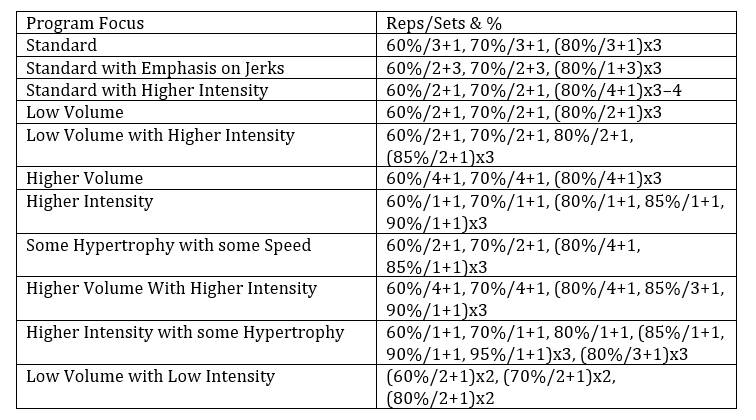Weightlifting
Welcome and thanks for visiting...

Sample Rep and Set Schemes for the Clean & Jerk

When training for the clean and jerk, varying rep and set schemes is critical to developing strength, technique, speed, and intensity at different stages of a training cycle. Below is a helpful breakdown of sample schemes tailored for different goals, such as intensity, volume, and technique reinforcement.
Clean & Jerk Programming Table

Relative Intensity and Programming Balance
An athlete using any of these schemes should have a proficient technique that is not going to deteriorate at the 80% intensity level. Optimal overall training should result in an average relative intensity around 77-78%. The average relative intensity will be balanced by the lower intensities of power snatches and power cleans and the higher intensities of pulls and deadlifts.
Order of Exercises in Training Sessions
These schemes should be programmed after snatches are programmed. The reason is that snatches are performed with higher velocities, and these are best achieved when the body is rested. Cleans are slightly slower and so should occupy the second position in the session order. Although jerks move faster than either snatches or cleans, they should not be affected by snatches, as the major muscles involved in the two movements do not overlap.
Advanced Strategies for Experienced Lifters
When lifters become more advanced, it is permissible to perform squatting prior to the inclusion of snatches and cleans. This will have the effect of pre-fatiguing the knee extensors and thus force the organism to recruit motor units that have previously not been involved.
Coaching Flexibility and Key Metrics
Coaches should not be hesitant about tailoring their rep/set schemes to suit the needs of the athlete and the conditions of training for competition. As long as the appropriate parameters are observed, variants can be programmed. Average relative intensity, macrocycle volume, and mesocycle volume should provide appropriate guidance, as well as reps per set.








